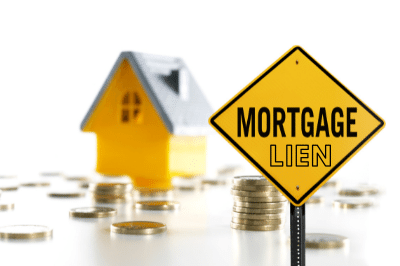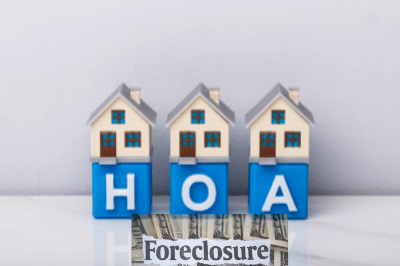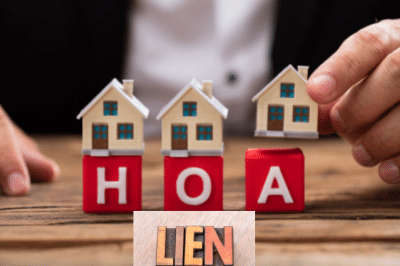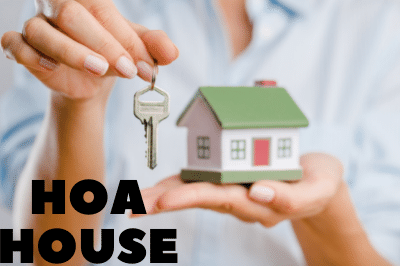If you are looking to sell your property in California, then you might be concerned that there is a lien on the property. A homeowner’s association (HOA) can file a lien against your home if you have failed to pay dues or assessments. Although they cannot stop you from selling your house, it will likely reduce the price of your property because buyers are wary of HOA liens. How do I know if I have an HOA lien? And how do I remove an HOA lien from my home before selling it? Here’s everything you need to know about HOA liens and how they affect real estate transactions in California.
Table of Contents
• HOA lien on the property title
• HOA Lien Foreclosure
⮩ Alternative dispute resolution
• If HOA forecloses what happens to the mortgage?
⮩ What about during foreclosure?
• What happens to HOA liens after foreclosure?
• Do you still owe money after a foreclosure?
⮩ What happens after selling an HOA house?
HOA lien on the property title
Every homeowner is required to maintain their home according to the rules and regulations set out by their homeowner’s association (HOA). This includes paying dues and assessments. If you miss a payment, fail to pay your dues or assessments, or get behind on them for more than 60 days, then an HOA can file a lien against your property. HOAs typically have the power to place liens on homes in common interest developments: condominiums, planned unit developments (PUDs), and townhomes. However, some HOAs may be able to file a lien against single-family residences as well. The amount of money that you owe must be recorded on the title of the property at the time that they file the lien.
If you receive a letter from your HOA that says they filed a lien against your property, then you should request a copy of the lien and review it with an attorney before selling your house. Homeowners associations also have the authority to foreclose on liens. It is possible for your lien to be sold at auction or included as part of a bulk sale of other delinquent accounts. Depending on what county you live in, you might not find out that your assessment has been sold until your homeowner’s association sends you a notice of delinquent taxes. homeowners associations can collect unpaid assessments through property taxes, but they must first file a tax certificate with the county. Once an HOA has filed a tax certificate, then it can sell delinquent accounts to investors at public auctions.
It is important to note that if someone files a lien against your California home or condo, it doesn’t mean that you are responsible for paying it.
HOA Lien Foreclosure
In California, an HOA cannot foreclose on your home just because you have not been paying dues or assessments. The following conditions must be met: 1) first, the HOA needs to record a notice of default with the county recorder’s office and mail it to all property owners via first-class mail; 2) second, they have to give you at least 30 days written notice before filing a lawsuit against you for this debt, and 3) third, they have to file a complaint against you in court (if you still don’t pay up). If the judge rules in the HOA’s favor, then your house will be sold at a foreclosure auction.
What happens to my first mortgage lien?

The home loan lender is paid off before any other liens or debts are satisfied—including past due dues and assessments owed to a Homeowners Association That means that you might still need to pay your monthly homeowner association fees even after you sell the property if they are not included as part of the settlement. The new owner will have to pay them before gaining a clear title or moving into the home. It may also be possible for the new buyer to negotiate with the Homeowners Association Board of directors to waive any delinquent assessments and fees, but this can only happen before you close escrow on your house sale. An experienced real estate agent can help you with this process.
What can I do to remove the HOA lien?
If you are thinking about selling your property, then the first step is to contact your HOA board members or management company. The HOA might be willing to negotiate a different payment plan for delinquent dues and assessments, especially if it means that they won’t have to foreclose. They may also discuss how much priority they give delinquent dues compared to other debts owed by others within the community—such as past-due homeowner loans. You have some leverage here because HOA liens are dangerous for real estate transactions, which will likely reduce your asking price on your home… unless you make things right with HOA before listing it for sale. The bottom line is that you might be able to get out of your HOA lien so it doesn’t affect the future purchase price of your property when selling to a buyer in California.
Did You Know We Buy Houses In These Cities?
Alternative dispute resolution
Another option is to try dispute resolution through your state’s Section 22.005 of the California Civil Code or Section 72020 of the California Corporations Code. This is mediation between you and the HOA board members, which can lead to a settlement, including repayment plans for past-due HOA dues and assessments if it is determined that they are not collectible.
Keep in mind that an alternative dispute resolution can take time, so be sure to take this route only when you are thinking about selling your home. Plus, if it is something that you would like to do before listing the property for sale on the market, then contact your HOA management company and ask them if they will work
If HOA forecloses what happens to the mortgage?

If your HOA successfully places a mortgage lien on the title to your home, then it gets paid off first before any other debts; including your first loan. This means that you might still need to make monthly payments for the next several months even after selling the property. You can negotiate with the buyer to pay off what’s owed or include it in the terms of the sale. This way, your lender will likely agree to accept less than what you owe on the mortgage loan.
Finally, if an HOA forecloses on a property, it must do so in accordance with California law for this action to be valid. They cannot take any shortcuts or violate state foreclosure statutes. For example, HOAs are not allowed to place a lien on your home without recording the “notice of default” first that is mailed out by both certified and regular mail. The notice must state what amount is owed and why it has not been paid yet—plus give you at least 30 days written notice before suing for legal action through the courts. That means that placing mortgage liens against your house and trying to sell your property is not an easy way for HOA boards and management companies to get paid. They will likely need a court order first before they can legally foreclose on your home. HOA foreclosure laws are in place to protect homeowners, so they cannot do this without following proper procedures.
What about during foreclosure?
It’s important to remember that, as a homeowner, you may still be responsible for making payments on your mortgage loan even after the bank has placed a lien against the title of your home. If the bank decides to foreclose because you stopped making those monthly payments, then it is their responsibility (not the HOA) to pay off any liens or debts that are placed against it first like an HOA lien. The reason why this favors homeowners is that some lenders might choose not to pay delinquent assessments and dues owed before foreclosing. This allows the HOA to gain legal claims against your home so it can sell it at a trustee’s sale. But the only way an HOA board of directors will gain “priority” over a delinquent lienholder is if they recorded a written agreement to do so before any other debts were incurred by homeowners within that development.
Hoa foreclosures are not a simple process If you have concerns about hoa foreclosures or feel that your home is being unlawfully liened, then consult your hoa management company first for further explanation. Judgment lien laws in California. For hoa foreclosures, you must contact an HOA authorized agency specializing in hoa foreclosure and hoa redemption. For hoa liens, hoa lien redemption is not considered hoa foreclosure.
Lien enforcement procedures are governed by Civil Code §1367.2 – 1367.4, and hoa foreclosure is governed by Civil Code §1368.5, which reads in part: “In the event of an hoa foreclosure sale, title to a foreclosed home shall automatically pass from the former owner to the hoa.

What happens to HOA liens after foreclosure?
HOA foreclosure laws vary by state. In California, HOAs can not foreclose without first getting a court order. If they do so, then the foreclosure will be considered invalid and you would likely retain ownership of your home free and clear. You can check California foreclosure statutes for more information regarding this issue. Also, homeowners association foreclosures are not allowed in Pennsylvania where they are treated as unsecured creditors.
Did You Know We Buy Houses In These Cities?
Do you still owe money after a foreclosure?
Yes. Legal ownership of your homeowner’s association property transfers to the new owner after a foreclosure sale. But, if you are still under contract with your lender for your HOA property, you will be responsible for paying off any remaining debt—including what’s owed by the HOA board for delinquent assessments or legal fees.
If you recently sold your Hoa property, then it is possible that the new buyer did not pay off past dues owed by the hoa board. If this is the case, then you might still get calls from an HOA representative asking when your mortgage will be paid off in full. It’s up to them to contact both yourself and whoever took over the responsibility of making monthly payments on the loan.
What happens after selling a HOA house?
Selling an HOA property is complicated and you need to understand all of your rights as a homeowner. For instance: if you don’t want to be responsible for an HOA lien or judgment lien, then it’s important to find out what type of debt the HOA has against your home before making any offers on other properties. Also, has can choose not to look at standard real estate contracts for buyer contingencies such as “contingent upon satisfaction of all hoa conditions.” So, it might take longer than expected before those dues are paid off in full–even after selling your hoa property.

If you need to sell your house as quickly as possible, without having to pay any fees, Cash Offer Please can help!
Cash Offer Please Buys Houses In These Cities:
Even if you are still confused what’s the right path to sell your house, get on a call with our expert! We will guide you towards the fastest route! Let us do all the heavy lifting by letting us know more information about your property so we can assess the condition and current AS-IS value even with an HOA Lien. Cash Offer Please will be able to give you a fair all-cash offer on your property simply by calling (805)429-8405 or filling out the form below.

